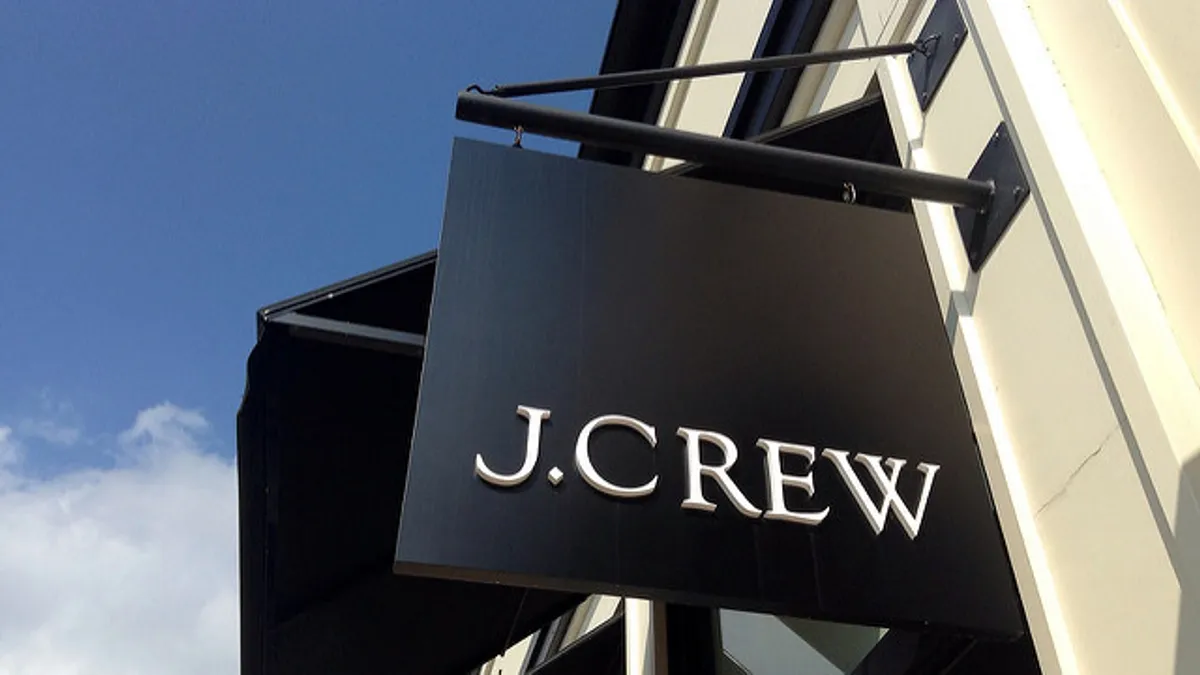Dive Brief:
-
J. Crew on Friday announced that total revenues were "essentially flat," dropping to $588.8 million from $587.6 million in the year-ago quarter. By brand, namesake J. Crew sales fell 7% to $399.1 million from $428.9 million, as Madewell sales grew 15% to $139.7 million from $121.7 million a year ago, according to a company press release.
-
Company comparable company sales fell 1% following an increase of 5% in the second quarter last year. By brand, J. Crew comps fell 4% after a 1% increase last year, while Madewell comps rose 10% following a 28% increase last year, the company said.
-
Net loss in the quarter widened to $44.2 million year over year from $6.1 million, "impacted by transaction, transformation and severance costs and a benefit related to the lease termination payment," the company said. Adjusted EBITDA fell to $41.8 million from $54.2 million last year, as gross margin declined to 35.6% from 38.5% last year.
Dive Insight:
Heavy debt and bleeding sales led J. Crew to abandon plans for an initial public offering years ago.
But the company has seen its way back to trading through Madewell. After building up the much smaller brand with the help of more stores and marketing, the company on Friday announced plans to spin off and go public with that brand instead.
The most recent quarter did little to blur the stark differences in the two trajectories in revenue, comps and brick-and-mortar expansion. As of Friday, the company operates 192 J.Crew stores, 133 Madewell stores and 172 factory stores, according to its release. Plans are to open 10 Madewell stores and one J.Crew and close about 20 (presumably most, if not all, J. Crew or factory stores) during the 2019 fiscal year, according to a Securities and Exchange Commission filing Friday.
That sets the stage for what GlobalData Retail Managing Director Neil Saunders sees as a sensible move — at least for Madewell.
"Given its performance, there is no doubt that Madewell is much better off as a stand alone entity," he told Retail Dive in an email. "At present it is overshadowed by the poor performance of J Crew and its future is clouded by the enormous debt pile the group is sitting on. As a separate company, those concerns will disappear. However, on the flip-side, J Crew will now be far more exposed and the performance and outlook will be considerably more negative without the contribution of Madewell."
It's not that Madewell will face no challenges, of course. Its denim focus could morph into a source of trouble should that segment falter, Saunders warned. "This is especially so in a market that is already oversaturated with choice," he said. "However, this is arguably true about any fashion focused chain so it is not something that especially applies to Madewell."
Plus, it's a tricky time for an IPO, especially considering the vagaries of the fashion market, according to Shawn Grain Carter, professor of fashion business management at the Fashion Institute of Technology.
"Madewell is indeed the juggernaut keeping J.Crew financially alive. That said, the IPO timing might not be the best given the volatility in the financial markets due to China tariffs, rising oil prices, slowing consumer spending on apparel, and rising federal debt," she told Retail Dive in an email. "This brand is resilient. However, fashion IPO's in this type of marketplace might need more than good gross margin profits and strong revenue generation to appease the financial wizards on Wall Street right now."
The Madewell IPO will garner the company some $100 million, though that remains a notional amount in this early stage. What is clear from the filings is that the company intends to use some of whatever that total eventually is to pay down its massive debt.
That has only grown. CFO Vincent Zanna said during an analyst call on Friday that total debt by the end of the quarter had reached $1.9 billion, up from the $1.7 billion of the previous year, although the company in its release states that total debt, net of discount and deferred financing costs, was down to $1.69 billion. J. Crew didn't respond to a Retail Dive question clarifying debt by press time. Additionally, net interest expense has swelled to $38 million, compared to $34 million last year. J. Crew has some $27 million in cash, down from the $35 million of the year-ago quarter, he also said.
J. Crew can't shake off its essential problems in fashion and retail quite as easily as it can wipe away some of that debt, however.
"This is essentially about splitting a troubled group into good and bad businesses. It is not a bad idea as the proceeds of the Madewell IPO can be used to pay down some of the debt burden," Saunders said. "However, the split will do nothing to revive J Crew: that can only come from a better strategy and improved assortments."
















